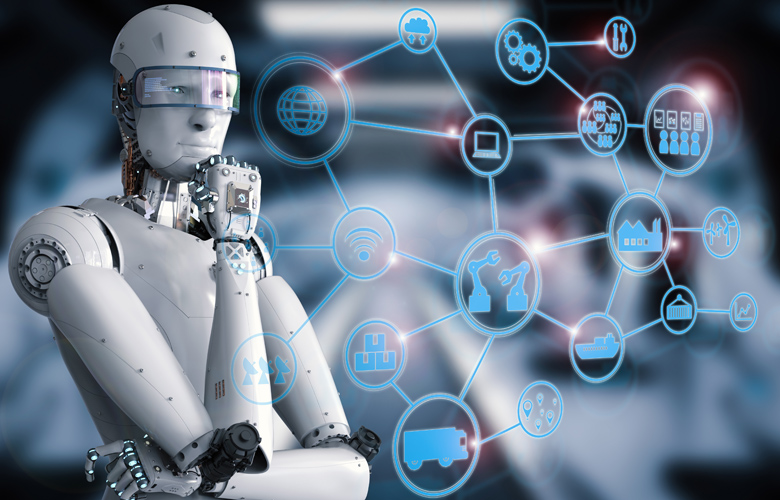An ongoing dialogue
Even before the concept of Artificial Intelligence (AI) was assimilated by the general public through its applications in various areas of daily life and business, one more term came to be added. It is about Creative Artificial Intelligence (Gen AI) that will have a catalytic impact on the way we live as we know it today.
What will the effects be on Greek businesses and the economy in general? Are Greek businesses ready to incorporate Creativity Artificial Intelligence in their operation? What are the key issues that have opened up at the international level regarding the technological “revolution” that is underway?
In order to understand the answers to these questions it is necessary to clarify the differences between “traditional” artificial intelligence and Creative Artificial Intelligence (Gen Al).
Artificial Intelligence and Creative Artificial Intelligence
In a study by Deloitte on behalf of SEPE, with the main objective of investigating the opportunities and perspective of Gen AI in Greece and especially in Greek entrepreneurship, but also the predicted impact of this new technology on the economy and on the employment of Technology, IT and of Communications (ICT) it is pointed out that:
Traditional Artificial Intelligence (AI) reproduces cognitive human functions (learning, planning, creativity) and focuses on processing the available and locating the appropriate information, in order to extract the required “knowledge” from its synthesis.
Main characteristics of AI are that it does not develop primitive content, it deals well with certain problems, for specific business functions, and it solves problems defined on the basis of specific rules. Human supervision and assistance in the learning process is essential. Also, traditional AI interprets information for pattern recognition and enhances predictive ability in decision making
Creative Artificial Intelligence (Gen AI), is several steps ahead as it performs deep learning, mimics the functioning of the brain when processing data and making decisions. Gen AI is based on machines or algorithms that have the ability to generate original content, such as text, images, audio, video.
Key features of Gen AI include developing original content, solving open-ended problems, performing intelligent, human-like action, and supporting the growth of creativity and improving the quality of original ideas.
Creative Artificial Intelligence requires limited human supervision and has autonomous learning capabilities, while performing a learning process based on existing information
The benefits for businesses and the Greek economy
In simple words, Generative Artificial Intelligence (Generative Artificial Intelligence – Gen AI), is a branch of Artificial Intelligence and has the ability to create original content (codes, images, videos, audio, text and 3D models), utilizing the processing of large volumes of data. Under specific circumstances and conditions, the benefits that can be achieved for businesses from adopting Gen AI solutions are multi-layered and concern both internal operation (e.g. better decision-making, cost savings, higher productivity) and external service delivery (e.g. .improved customer experience).
In particular, Gen AI solutions can be used across the entire spectrum of a company’s activity, with the main categories of use cases identified being customer service, content development, code management, knowledge management and unstructured information extraction data.
Regarding the projected impact of Gen AI on the country’s GDP, Deloitte’s study concluded that its impact is predicted to be very significant, with a cumulative impact estimated at +5.5% on the country’s GDP by 2030 ( i.e. 10.7 billion euros), which under certain conditions can even reach up to +9.8%. About 50% of this impact is estimated to come from 5 sectors of the economy: Financial and Insurance Sector, Wholesale Trade, Manufacturing, Service Provision and Information & Communication. As for the impact of Gen AI on the specialist ICT gap, it is also expected to be significant, with the projected gap between supply and demand increasing by approximately 25,500 positions cumulatively reaching approximately 83,000 positions by 2030. The implementation of policy measures that will lead to the reduction of the gap of ICT specialists becomes imperative, with a particular importance now having focused and fast-paced skills development programs for STEM graduates as well as other directions that lead to certifications with a reflection on the labor market.
As the research shows, the adoption of Gen AI in Greek businesses of all sectors of the economy is still at an early stage. The survey surveyed around 200 businesses across industries and only 15% said they have started experimenting with this advanced digital technology, even though 8 out of 10 businesses believe that adopting Gen AI solutions can improve efficiency and boost their development.
In addition, the survey was addressed to approximately 100 companies in the Technology, Information and Communications (ICT) sector. Two out of 3 companies said they have not yet adapted their strategy to incorporate Gen AI solutions. At the same time, 3 out of 5 companies in the ICT industry estimate that the advent of Gen AI will create significant support needs for other industries, thus exacerbating the challenge they face in finding properly trained personnel, as there is a significant gap between the supply and demand for ICT specialists. On the occasion of the presentation of the study at the recent conference of the SEPE Digital Economy Forum, Nikos Christodoulou, Partner, Consulting Leader, Deloitte Greece, pointed out that from the findings of the primary research it is clear that today businesses are still in the stage of “discovery” and “experimentation ”, however if they implement Gen AI solutions in the future, the significant improvement in their productivity will also bring further benefits to the economy. Taking advantage of the opportunity created by Gen AI is expected to exacerbate the already recognized supply-demand gap of the necessary skills, and therefore it becomes even more important to put in place policy measures to support the employment of ICT specialists, he added.
Artificial Intelligence and Finance
In particular, with regard to the gradual application of Artificial Intelligence in the financial sector, as stated in an interview with APE/MPE and journalist Aleko Lidorikis, bank executive training consultant and former Banking and Investment Services Ombudsman Dimitris Pavlakis, it enables banks to improve communication and their general relationship with their customers. Something that is a primary goal for banks at an international and domestic level, as competition in the sector has intensified with the entry of third parties.
Banks, as Mr. Pavlakis mentions, with the use of machine learning and natural language algorithms, are gradually able to recognize and interpret the needs of their customers even more precisely, reaching the point of offering each customer personalized financial solutions and advice. Depending on their age profile, family, financial and consumer habits and the investment risk they want to take.
Artificial intelligence will enable automatic processing and execution of transactions, reducing time and cost for customers and banks, while also contributing to strengthening banking security, which is also a major industry challenge. More specifically, says Mr. Pavlakis, by analyzing large volumes of data, artificial intelligence will recognize patterns and anomalies in transactions, identifying potential fraud and threats, while it will be able to predict the need to combat fraud and take proactive measures measures to protect customers and banks.
Mr. Pavlakis also refers to the challenges from the application of artificial intelligence in the banking industry, focusing on the need for strict adherence to customer data protection and security measures, in the context of the data collection and processing process. Another challenge is to further shield them from the risks of cyber-attacks and data loss, with continued investment in advanced protection systems to deal with such incidents as well as to remediate any issues. With the increased use of technology and the automation of certain tasks, there is a risk of job losses for certain professional areas within banks. However, at a time when the need for personal contact between the bank customer and his bank advisor will never disappear, this challenge is limited by the decisive role acquired by further education and re-professional training in the banking sector in order for employees to adapt to the new technologies and at the same time maintain their employment in the new roles they will be asked to play.
The general developments in the field of Artificial Intelligence
However, Artificial Intelligence does not only change business, but shapes a new way of life, having opened a window of dialogue on an international level about what it can reach and what effects it can have. The president of the Stavros Niarchos Foundation (SNF) Andreas Drakopoulos, in his message for 2024 (which focuses on the Foundation’s initiatives for the new year) typically states: “The incredible developments in artificial intelligence leave no doubt, fortunately or unfortunately, about with the fact that we are at the dawn of a new technological era, which will test human limits. The prospects, while certainly exciting in one sense, are also deeply troubling. While the new technology of artificial intelligence promises amazing, positive developments in areas such as health and scientific research, as well as in our daily lives, the existential question that arises is whether we collectively – human society – will be able to manage the disadvantages and avoid potentially catastrophic collateral losses. Can we all do our best together to make the most of the opportunities while managing the challenges that present themselves? Can we maintain our human side as a society?”
More generally, from the public debate at international and national level, among other things, the need to maintain moderation and the role of the human factor and its enormous potential are becoming more and more apparent.




